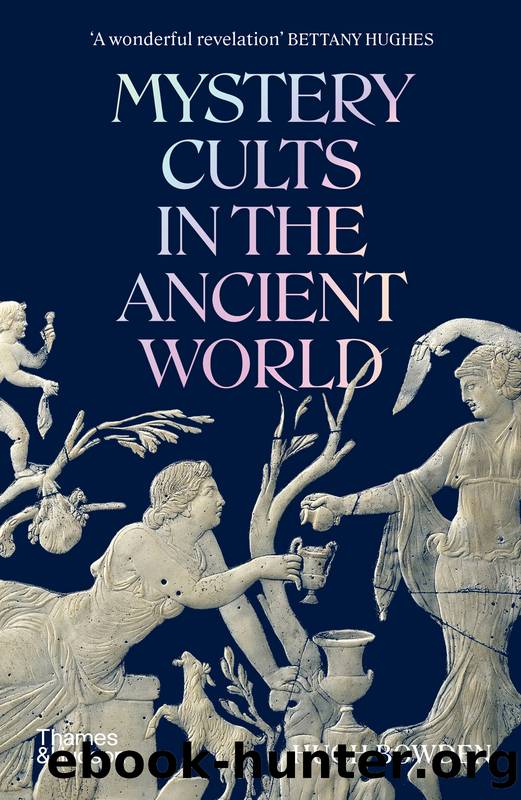Mystery Cults in the Ancient World by Hugh Bowden

Author:Hugh Bowden
Language: eng
Format: epub
Publisher: Thames & Hudson Ltd
Published: 2023-12-15T00:00:00+00:00
INITIATORS AND PHILOSOPHERS
Most of the surviving part of the Derveni Papyrus is concerned with the precise meaning of the words of the Orphic poem on which it is commenting. Here scholars have seen strong influence from Presocratic philosophy, and in particular two philosophers who wrote in the middle of the fifth century BC, Anaxagoras of Clazomenae and Diogenes of Apollonia. We have relatively little information about Diogenes, but Anaxagoras was a fairly prominent figure in Athens and a friend of the statesman Pericles. He was supposedly tried for denying the divinity of the sun and moon, preferring natural explanations for the phases of the moon and eclipses.15 This preference for âscientificâ natural explanations for phenomena rather than âirrationalâ religious ones is usually taken to characterize the Presocratic philosophers in general, so to find a writer who uses the ideas of Anaxagoras to interpret the poetry of Orpheus, and who also appears to be an orpheotelestes himself, is interesting. In his Meno, Plato has Socrates talk about âcertain priests and priestesses who have studied so as to be able to give a reasoned account of their activitiesâ, who understand what happens to the soul after death:
They say that the soul of man is immortal, and at one time comes to an end, which is called dying, and at another is born again, but never perishes. Consequently one ought to live all oneâs life in the utmost holiness. For from whomsoever âPersephone shall accept requital for ancient wrong, the souls of these she restores in the ninth year to the upper sun again; from them arise glorious kings and men of splendid might and surpassing wisdom, and for all remaining time are they called holy heroes amongst mankind.â16
The quotation is assumed to be from Pindar, a poet writing in the first half of the fifth century BC, who is generally treated respectfully by later prose authors. Religious practitioners who understand what they are doing, and are knowledgeable about what happens to the souls of the dead, sound very much like the author of the Derveni Papyrus.17
In fact, it would be wrong to draw too firm a line between Presocratic philosophers and religious practitioners. Herodotus, a historian who was very interested in religious subjects and was, as we have seen, an initiate of the Great Gods of Samothrace and probably of other cults too, was very much part of the intellectual world in which Presocratic philosophers and other âscientificâ writers worked. In his account of Egypt in particular, his discussion moves from geology to theology and back again, referring to the evidence for both equally. The Sicilian philosopher Empedocles, also writing in the middle of the fifth century BC, could promise his followers the power to prevent disease and old age, to control the winds and to raise the dead. Empedoclesâ work was known in antiquity by the title Purifications, and his claims appear rather similar to those of the agyrtai attacked in the passage from Platoâs Republic quoted above.18 Pythagoras, considered in more detail below, is another philosopher associated with initiation.
Download
This site does not store any files on its server. We only index and link to content provided by other sites. Please contact the content providers to delete copyright contents if any and email us, we'll remove relevant links or contents immediately.
| Buddhism | Christianity |
| Ethnic & Tribal | General |
| Hinduism | Islam |
| Judaism | New Age, Mythology & Occult |
| Religion, Politics & State |
Cecilia; Or, Memoirs of an Heiress — Volume 1 by Fanny Burney(31338)
Cecilia; Or, Memoirs of an Heiress — Volume 3 by Fanny Burney(30935)
Cecilia; Or, Memoirs of an Heiress — Volume 2 by Fanny Burney(30891)
The Secret History by Donna Tartt(16635)
Sapiens: A Brief History of Humankind by Yuval Noah Harari(13059)
Leonardo da Vinci by Walter Isaacson(11907)
The Radium Girls by Kate Moore(10910)
Sapiens by Yuval Noah Harari(4540)
The Wind in My Hair by Masih Alinejad(4426)
How Democracies Die by Steven Levitsky & Daniel Ziblatt(4401)
Homo Deus: A Brief History of Tomorrow by Yuval Noah Harari(4282)
Endurance: Shackleton's Incredible Voyage by Alfred Lansing(3845)
The Silk Roads by Peter Frankopan(3764)
Man's Search for Meaning by Viktor Frankl(3636)
Millionaire: The Philanderer, Gambler, and Duelist Who Invented Modern Finance by Janet Gleeson(3571)
The Rape of Nanking by Iris Chang(3518)
Hitler in Los Angeles by Steven J. Ross(3439)
The Motorcycle Diaries by Ernesto Che Guevara(3338)
Joan of Arc by Mary Gordon(3260)
